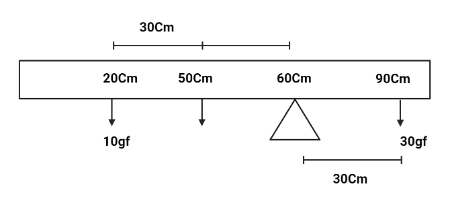Question
Question: A uniform metre scale is balanced at \(60\,cm\) mark, when weight of \(10\,gf\) and \(30\,gf\) are s...
A uniform metre scale is balanced at 60cm mark, when weight of 10gf and 30gf are suspended at 20cm mark and 90cm mark respectively. Calculate the weight of the metre scale ?
Solution
Since the metre scale has a constant density, the ruler's centre of gravity would be in the middle. According to the theory of moments, an object is in equilibrium if the number of anticlockwise moments about the same pivot equals the sum of clockwise moments.
Complete step by step answer:

The mid-point of the meter scale is 50cm , let us denote this weight as W. Now, we know that two moments will act on the meter scale, that is clockwise and anticlockwise.
Let us first calculate clockwise moment:
The formula to calculate the clockwise moment is: Mass × Distance of the weight from pivot.
It is given in the question that mass=30 and Distance of the weight from pivot 90−60=30cm.
Substituting the values we get,
30×30 ⇒900gf.cm
Now, Let us calculate anticlockwise moment:
The formula to calculate the anticlockwise moment is: Mass × Distance of the weight from pivot.
It is given that there are two mass=10 and W and Distance of the weight from pivot 60−20=40cm and 60−50=10cm respectively
Substituting the values we get,
10×40+W×10 ⇒400+10W
According to the principle of moment,
Anticlockwise moment =Clockwise moment.
900=400+10W ⇒900−400=10W ⇒500=10W ∴W=50gf
Hence, the weight of the meter scale is 50gf.
Note: A metre is a measurement unit that is used to determine the length of an object. A metre scale is used to determine the length of an item. A metre scale is graduated (or marked) in 100 centimetres, with each centimetre divided into ten millimetre divisions.
